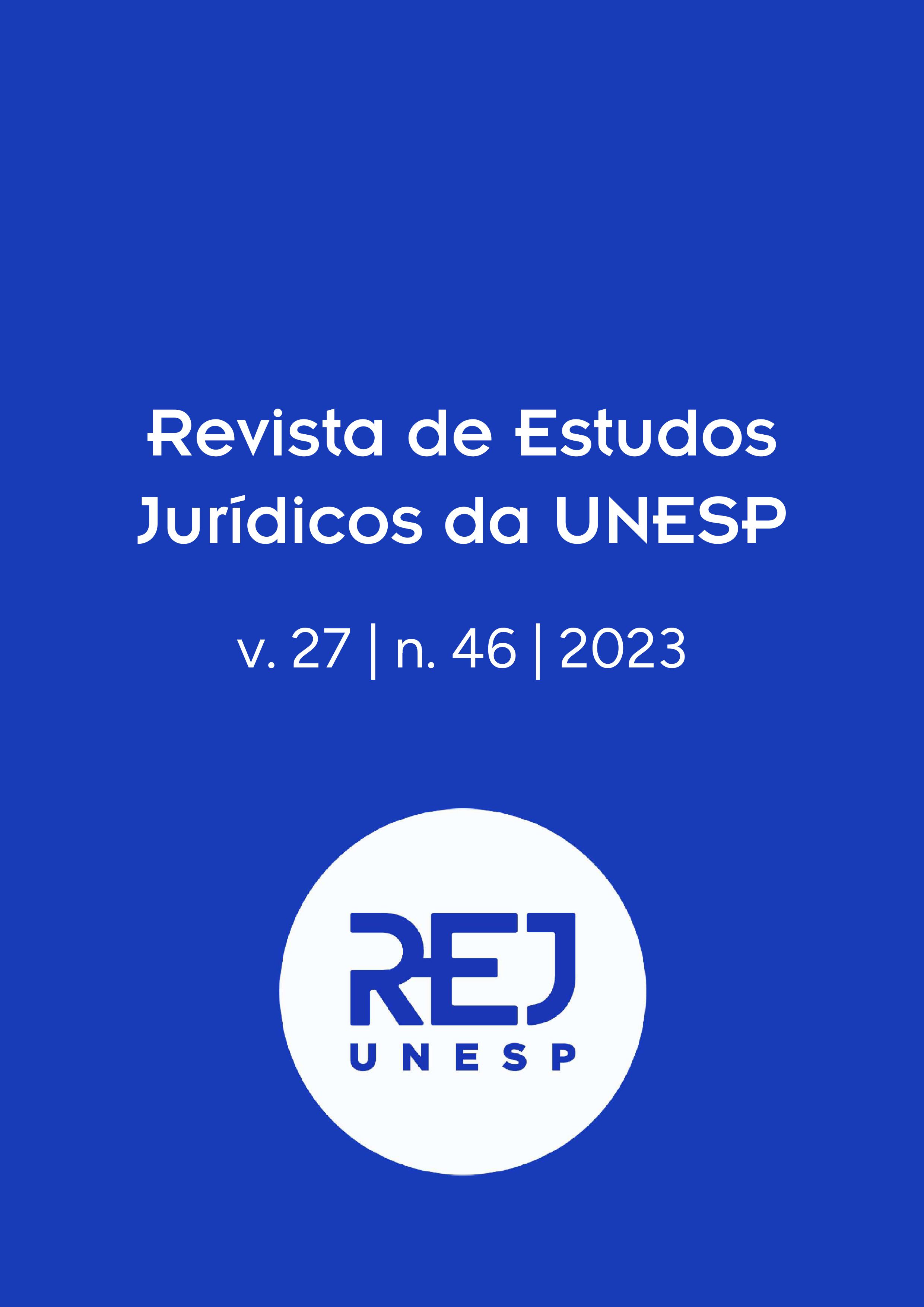INVISIBILIDADE E SUB-CIDADANIA NO BRASIL: UMA INTERPRETAÇÃO CONSTITUCIONAL EVOLUTIVA DA VEDAÇÃO DO DIREITO AO VOTO DE PRESOS E CONDENADOS CRIMINAIS
DOI:
https://doi.org/10.22171/rejunesp.v27i46.3951Palavras-chave:
Direitos políticos, Voto, Condenação criminal, Teoria do reconhecimento, Interpretação constitucionalResumo
No Brasil e em inúmeros países, as constituições parecem restringir o direito ao voto de presos e condenados criminais, excluindo-os temporariamente do corpo de eleitores. No presente estudo, investigamos, com base na “teoria do reconhecimento” (Honneth), a condição de invisibilidade social vivenciada por eles, buscando compreender como experiências subjetivas de ausência de reconhecimento podem motivar, psiquicamente, uma luta por mudanças sociais. Reconhecendo, entretanto, as dificuldades enfrentadas por tal grupo social, o presente estudo desenvolve uma interpretação constitucional evolutiva, apoiada na “metódica estruturante” (Müller), acerca da vedação ao direito de voto de presos e condenados criminais. É analisado o artigo 15 da Constituição de 1988, indo além de seu texto (elemento linguístico) para agregar, na concretização da norma, uma leitura sistemática de outros dispositivos constitucionais, além de dados importantes da realidade brasileira (elemento empírico), tais como o significado social de cidadania e o problema do crescimento da população carcerária no país.
Downloads
Referências
ABOWITZ, Kathleen Knight; HARNISH, Jason. Contemporary discourses of citizenship. Review of Educational Research, vol. 76, n. 4, 2006, pp. 653-690. https://doi.org/10.3102/00346543076004653
ACKERMANN, Bruce. The Holmes Lectures: the living Constitution. Harvard Law Review, vol. 120, n. 7, 2007, pp. 1737-1812.
ADEODATO, João Maurício. Ética & retórica: para uma teoria da dogmática jurídica. 5ª ed. São Paulo, Saraiva, 2012.
ALEXANDER, Michelle. A nova segregação racial: racismo e encarceramento em massa. São Paulo: Boitempo, 2017.
AMADEO, Javier. Identidade, reconhecimento e redistribuição: uma análise crítica do pensamento de Charles Taylor, Axel Honneth e Nancy Fraser. Política & Sociedade, vol. 16, n. 35, jan./abr. 2017, pp. 242-270. https://doi.org/10.5007/2175-7984.2017v16n35p242
BARCINSKI, Mariana; CÚNICO, Sabrina Daiana. Os efeitos (in)visibilizadores do cárcere: as contradições do sistema prisional. Revista Psicologia, vol. 28, 2014, pp. 63-70. https://doi.org/10.17575/rpsicol.v28i2.696
BARKOW, Rachel Elise. Prisoners of politics: breaking the cycle of mass incarceration. Cambridge, Massachusetts, EUA: Harvard University Press, 2021.
BOTELHO, André; SCHWARCZ, Lilia Moritz. Cidadania e direitos: aproximações e relações. In: BOTELHO, André; SCHWARCZ, Lilia Moritz (orgs.). Cidadania, um projeto em construção: minorias, justiça e direitos. São Paulo: Claro Enigma, 2012.
BRENNAN CENTER FOR JUSTICE. Criminal disenfranchisement laws across the United States, mai. 2019. Disponível em: <https://www.brennancenter.org/issues/ensure-every-american-can-vote/voting-rights-restoration/disenfranchisement-laws>. Acesso em: 25 jun. 2022.
CARVALHO, José Murilo de. Cidadania no Brasil: o longo caminho. 27ª ed. Rio de Janeiro: Civilização Brasileira, 2021.
CLEMENTE, Augusto Junior. Cidadania: um conceito inútil? Curitiba: Appris, 2020.
CONSELHO NACIONAL DE JUSTIÇA. Estatística de execução penal: dados carregados em tempo real pelos tribunais que operam o Sistema Eletrônico de Execução Unificado (SEEU). Brasília, 2022. Disponível em: <https://www.cnj.jus.br/sistema-carcerario/paineis-estatisticos/>. Acesso em: 12 jul. 2022.
CRAWLEY, Elaine; SPARKS, Nicholas. Older men in prison: survival, coping and identity. In: LIEBLING, Alison; MARUNA, Shadd (eds.). The effects of imprisonment. Londres e Nova Iorque: Routledge, 2011.
DAGNINO, Evelina. Os movimentos sociais e a emergência de uma nova noção de cidadania. In: DAGNINO, Evelina (org.). Os anos 90: política e sociedade no Brasil. São Paulo: Brasiliense, 2004.
DE GIORGI, Alessandro. A miséria governada através do sistema penal. Rio de Janeiro: Revan, 2006.
DEPARTAMENTO PENITENCIÁRIO NACIONAL. Levantamento nacional de informações penitenciárias. Brasília, 2022. Disponível em: <https://www.gov.br/depen/pt-br/servicos/sisdepen>. Acesso em: 12 jul. 2022.
EINAT, Tomer. ‘Soldiers’, ‘sausages’ and ‘deep sea diving’: language, culture and coping in Israeli prisons. In: LIEBLING, Alison; MARUNA, Shadd (eds.). The effects of imprisonment. Londres e Nova Iorque: Routledge, 2011.
FAIR, Helen; WALMSLEY, Roy. World prison population list, 13th ed., 2021. Disponível em: <https://www.prisonstudies.org/sites/default/files/resources/downloads/world_prison_population_list_13th_edition.pdf>. Acesso em: 25 jun. 2022.
FERRARINI, Luigi Giuseppe Barbieri. Cárcere e voto: a morte social pela suspensão dos direitos políticos do condenado. Belo Horizonte: D’Plácido, 2021.
FRASER, Nancy. From redistribution to recognition? Dilemmas of justice in a ‘post-socialist’ age. New Left review, vol. 0, ed. 212, jul. 1995, pp. 68-149.
______. Social justice in the age of identity politics: redistribution, recognition, and participation. WZB Discussion Paper, FS I 98-108, dez. 1998, pp. 1-14. Disponível em: <https://www.econstor.eu/bitstream/10419/44061/1/269802959.pdf>. Acesso em: 23 jun. 2022.
GARLAND, David. The culture of control. Nova Iorque: Oxford University Press, 2001.
GOFFMAN, Erving. Stigma: notes on the management of spoiled identity. Nova Iorque: Touchstone Books, 1986.
GONÇALVES, Leonel Cunha; GONÇALVES, Rui Abrunhosa. Agressividade, estilo de vida criminal e adaptação à prisão. Psicologia USP, vol. 23, 2012, pp. 559-584. https://doi.org/10.1590/S0103-65642012005000013
GRAU, Eros Roberto. Por que tenho medo dos juízes (a interpretação/aplicação do direito e os princípios. 10ª ed. São Paulo: Malheiros, 2021.
GROVER, Sonja C. Judicial activism and the democratic rule of law: selected case studies. Nova Iorque: Springer International Publishing, 2020. https://doi.org/10.1007/978-3-030-35085-7
GUIMARÃES, Cristian Fabiano; MENEGHEL, Stela Nazareth; OLIVEIRA, Carmen Silveira de. Subjetividade e estratégias de resistência na prisão. Psicologia: Ciência e Profissão, vol. 26, 2006, pp. 632-645. https://doi.org/10.1590/S1414-98932006000400010
HARDING, David J. Jean Valjean’s dilema: the management of ex-convict identity in the Search for employment. Deviant behavior, vol. 24, n. 6, 2003, pp. 571-595. https://doi.org/10.1080/713840275
HESSE, Konrad. A força normativa da Constituição. Porto Alegre: Sergio Antonio Fabris Editor, 1991.
______. Elementos de direito constitucional da República Federal da Alemanha. Porto Alegre: Sergio Antonio Fabris Editor, 1998.
HONNETH, Axel. Invisibility: on the epistemology of ‘recognition’. Aristotelian Society Supplementary Volume, vol. 75, jul. 2001, pp. 111-126. Disponível em: <https://onlinelibrary.wiley.com/doi/10.1111/1467-8349.00081>. Acesso em: 23 jun. 2022. https://doi.org/10.1111/1467-8349.00081
______. Luta por reconhecimento: a gramática moral dos conflitos sociais. 2ª ed. São Paulo: Editora 34, 2009.
IGNATIEFF, Michael. The myth of citizenship. In: BREINER, Ronald (ed.). Theorizing citizenship. Albany, EUA: State University of New York Press, 1995.
ISIN, Engin F.; TURNER, Bryan S. Investigating citizenship: an agenda for citizenship studies. Citizenship Studies, vol. 11, n. 1, fev. 2007, pp. 5-17. https://doi.org/10.1080/13621020601099773
ISPAHANI, Laleh. Voting rights and human rights: a comparative analysis of criminal disenfranchisement laws. In: EWALD, Alec; ROTTINGHAUS, Brandon (orgs.). Criminal disenfranchisement in an international perspective. Cambridge, Inglaterra: Cambridge University Press, 2009. https://doi.org/10.1017/CBO9780511576713.003
KYMLICKA, Will; NORMAN, Wayne. Returno of the Citizen: a survey of recente work on citizenship theory. Ethics, vol. 104, jan. 1994, pp. 352-381. https://doi.org/10.1086/293605
LETSAS, George. The ECHR as a living instrument: its meaning and legitimacy. In: FØLLESDAL, Andreas; PETERS, Birgit; ULFSTEIN, Geir (eds.). Constituting Europe: The European Court of Human Rights in a national, european and global context. Cambridge: Cambridge University Press, 2013. https://doi.org/10.1017/CBO9781139169295.005
LIEBLING, Alison; MARUNA, Shadd. Introduction: the effects of imprisonment revisited. In: LIEBLING, Alison; MARUNA, Shadd (eds.). The effects of imprisonment. Londres e Nova Iorque: Routledge, 2011.
MANZA, Jeff; UGGEN, Christopher. Locked out: felon disenfranchisement and American democracy. Nova Iorque: Oxford University Press, 2008.
MARSHALL, T. H.; BOTTOMORE, Tom. Cidadania e classe social. São Paulo: Editora Unesp, 2021.
MAUER, Marc. Mass imprisonment and the disappearing voters. In: MAUER, Marc; CHESNEY-LIND, Meda (orgs.). Invisible punishment: the colateral consequences of mass imprisonment. Nova Iorque: The New Press, 2002.
MELOSSI, Danilo; PAVARINI, Massimo. Cárcere e fábrica: as origens do sistema penitenciário (séculos XVI – XIX). 2ª ed. Rio de Janeiro: Revan, 2010.
MOUFFE, Chantal. A cidadania democrática e a comunidade política. Estudos de sociologia, v. 2, n. 2, 1997, pp. 59-68.
MOWBRAY, Alastair. The creativity of the European Court of Human Rights. Human Rights Law Review, vol. 5, n. 1, 2005, pp. 57-79. https://doi.org/10.1093/hrlrev/ngi003
MÜLLER, Friedrich. Métodos de trabalho no direito constitucional. Rio de Janeiro: Renovar, 2005.
______. Teoria estruturante do direito. São Paulo: Editora Revista dos Tribunais, 2008.
MURPHY, Walter F.; FLEMING, James E.; BARBER, Sotirios A.; MACEDO, Stephen. American constitutional interpretation. 4th ed. Nova Iorque, EUA: Thomson West/Foundation Press, 2008.
PEDRA, Adriano Sant’Ana. La inelegibilidad del analfabeto en Brasil: por una lectura más democrática. Estudios constitucionales, año 9, n. 1, 2011, pp. 227-244. https://doi.org/10.4067/S0718-52002011000100008
______. Mutação constitucional: interpretação evolutiva da Constituição na democracia constitucional. 4ª ed. Rio de Janeiro: Lumen Juris, 2020.
PEDRON, Flávio Quinaud; OMMATI, José Emílio Medauar. Teorias contemporâneas do direito: análise crítica das principais teorias jurídicas da atualidade. Belo Horizonte: Conhecimento Editora, 2022.
PÉREZ LUÑO, Antonio-Enrique. La interpretación de la Constitución. Revista de las Cortes generales, n. 1, 1984, pp. 82-132. Disponível em: <https://revista.cortesgenerales.es/rcg/article/view/227>. Acesso em: 5 jul. 2022. https://doi.org/10.33426/rcg/1984/1/227
PINSKY, Jaime. Introdução. In: PINSKY, Jaime; PINSKY, Carla Bassanezi (orgs.). História da cidadania. 6ª ed. São Paulo: Contexto, 2021.
REHNQUIST, William H. The notion of a living Constitution. Harvard Journal of Law & Public Policy, vol. 29, n. 2, 2006, pp. 401-415.
RESENDE, Selmo Haroldo. Narrativas de presos condenados: um vocabulário da prisão. Revista Eletrônica de Educação, vol. 7, 2013, pp. 361-368. https://doi.org/10.14244/19827199684
ROTTINGHAUS, Brandon; BALDWIN, Gina. Voting behind bars: explaining variation in international enfranchisement practices. Electoral Studies, vol. 26, 2007, pp. 688-298. Disponível em: <https://www.sciencedirect.com/science/article/abs/pii/S0261379407000182>. Acesso em: 19 jun. 2022. https://doi.org/10.1016/j.electstud.2007.02.001
RUSCHE, Georg; KIRCHHEIMER, Otto. Punição e estrutura social. 2ª ed. Rio de Janeiro: Revan, 2004.
SEMER, Marcelo. Sentenciando tráfico: o papel dos juízes no grande encarceramento. São Paulo: Tirant lo Blanch, 2019.
SIEMSEN, Pedro. A eleição atrás das grades. Revista Piauí. 7 jan. 2021. Disponível em: <https://piaui.folha.uol.com.br/eleicao-atras-das-grades/>. Acesso em: 12 jul. 2022.
SIMON, Jonathan. Governing through crime: how the war on crime transformed American democracy and created a culture of fear. Nova Iorque: Oxford University Press, 2007.
SYKES, Gresham M. The society of captives: a study of a maximum security prison. Princeton, EUA: Princeton University Press, 2007. https://doi.org/10.1515/9781400828272
TAYLOR, Charles. The politics of recognition. In: GUTMANN, Amy (org.). Multiculturalism: examining the politics of recognition. Princeton, EUA: Princeton University Press, 1994.
THE SENTENCING PROJECT. Felony disenfranchisement, abr. 2014. Disponível em: <https://www.sentencingproject.org/wp-content/uploads/2015/12/Felony-Disenfranchisement-Laws-in-the-US.pdf>. Acesso em: 15 jun. 2022.
THEIL, Stefan. Is the ‘living instrument’ approach of the European Court of Human Rights compatible with the ECHR and International Law? European Public Law, vol. 23, n. 3, 2017, pp. 587-614. https://doi.org/10.54648/EURO2017033
TONRY, Michael. Punishing race: a continuing American dilema. Nova Iorque: Oxford University Press, 2011.
TRAVIS, Jeremy. Invisible punishment: as instrument of social exclusion. In: MAUER, Marc; CHESNEY-LIND, Meda (orgs.). Invisible punishment: the colateral consequences of mass imprisonment. Nova Iorque: The New Press, 2002.
TRIBE, Lawrence. American constitutional law. 3a ed. Nova Iorque, EUA: Foundation Press, 2000.
UGGEN, Christopher; VAN BRAKLE, Mischelle; McLAUGHLIN, Heather. Punishment and social exclusion: national diferences in prisoner disenfranchisement. In: EWALD, Alec; ROTTINGHAUS, Brandon (orgs.). Criminal disenfranchisement in an international perspective. Cambridge, Inglaterra: Cambridge University Press, 2009. https://doi.org/10.1017/CBO9780511576713.004
UGGEN, Christopher et al. Locked out 2020: estimates of people denied voting rights due to a felony conviction. The Sentencing Project, out. 2020. Disponível em: <https://www.sentencingproject.org/publications/locked-out-2020-estimates-of-people-denied-voting-rights-due-to-a-felony-conviction/>. Acesso em: 25 jun. 2022.
WACQUANT, Loïc. Punir os pobres: a nova gestão da miséria nos Estados Unidos [a onda punitiva]. 3ª ed. Rio de Janeiro: Revan, 2007.
WILSON, T.A. Institution’s impact on inmate identity. Californi Youth Authority Quarterly, vol. 27, n. 3, 1974, pp. 21-27.
Downloads
Publicado
Como Citar
Edição
Seção
Licença
Copyright (c) 2024 Revista de Estudos Jurídicos da UNESP

Este trabalho está licenciado sob uma licença Creative Commons Attribution 4.0 International License.
























